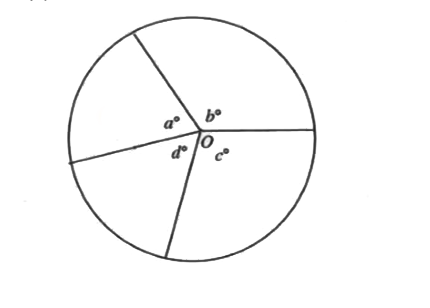If a,b,c,d are distinct numbers such that : a+C=2d and b+d=2c , which of the following statements must be ture ?
I. a cannot be the average of a,b,c,d.
II b can be the average of a,b,c,d .
III d can be the average of a,b,c,d.
Only statement (I)
Only statement (II)
Only statement (III)
Both statements (I) and (II)
The correct Answer is:A
To solve the problem, we need to analyze the given equations and check the validity of each statement regarding the averages of the numbers a, b, c, and d.
1. Understand the Given Equations:
We have two equations:
a+c=2d(1)
b+d=2c(2)
2. Calculate the Average of a, b, c, and d:
The average A of the four numbers a, b, c, and d is given by:
A=a+b+c+d4
3. Substituting from the Given Equations:
From equation (1), we can express a+c in terms of d:
a+c=2d⟹c=2d−a(3)
From equation (2), we can express b+d in terms of c:
b+d=2c⟹b=2c−d(4)
4. Substituting c from Equation (3) into Equation (4):
Replace c in equation (4):
b=2(2d−a)−d=4d−2a−d=3d−2a(5)
5. Now Substitute b and c into the Average Formula:
Substitute equations (3) and (5) into the average formula:
A=a+(3d−2a)+(2d−a)+d4
Simplifying this:
A=a+3d−2a+2d−a+d4=(3d+2d+d)+(a−2a−a)4=6d−2a4=3d−a2
6. Analyzing Each Statement:
- Statement I: a cannot be the average of a,b,c,d.
- From our average calculation, A=3d−a2. For a to be the average, we would need a=3d−a2, which leads to 2a=3d−a or 3a=3d or a=d. Since a and d are distinct, this statement is true.
- Statement II: b can be the average of a,b,c,d.
- For b to be the average, we would need b=3d−a2. This is not guaranteed since b depends on d and a and does not necessarily equal the average. Thus, this statement is false.
- Statement III: d can be the average of a,b,c,d.
- For d to be the average, we would need d=3d−a2. This leads to 2d=3d−a or d+a=0, which is not guaranteed since a and d are distinct. Thus, this statement is false.
Conclusion:
Only Statement I is true. Therefore, the answer is that only Statement I must be true.
We have two equations:
a+c=2d(1)
b+d=2c(2)
The average A of the four numbers a, b, c, and d is given by:
A=a+b+c+d4
From equation (1), we can express a+c in terms of d:
a+c=2d⟹c=2d−a(3)
From equation (2), we can express b+d in terms of c:
b+d=2c⟹b=2c−d(4)
Replace c in equation (4):
b=2(2d−a)−d=4d−2a−d=3d−2a(5)
Substitute equations (3) and (5) into the average formula:
A=a+(3d−2a)+(2d−a)+d4
Simplifying this:
A=a+3d−2a+2d−a+d4=(3d+2d+d)+(a−2a−a)4=6d−2a4=3d−a2
- Statement I: a cannot be the average of a,b,c,d.
- From our average calculation, A=3d−a2. For a to be the average, we would need a=3d−a2, which leads to 2a=3d−a or 3a=3d or a=d. Since a and d are distinct, this statement is true.
- For b to be the average, we would need b=3d−a2. This is not guaranteed since b depends on d and a and does not necessarily equal the average. Thus, this statement is false.
- For d to be the average, we would need d=3d−a2. This leads to 2d=3d−a or d+a=0, which is not guaranteed since a and d are distinct. Thus, this statement is false.
Only Statement I is true. Therefore, the answer is that only Statement I must be true.
Topper's Solved these Questions
Similar Questions
Knowledge Check
If a,b,c ,d are four distinct numbers such that : a+c=2d and b+d=2c , Which of the following is the correct expression for the average of the four numbers ?
Ac+dB3a+c4Ca+2c2Db+3d4The average of a, b, c, d, and e is 28. If the average of a, c, and e is 24, what is the average of b and d?
A31B32C33D34The average of a, b, c, and d is p. If the average of a and c is q, what is the average of b and d in terms of p and q?
A2p+qB2p−qC2q+qD2q−p
If a, b, c, d are in proportion, then
(a)ab=cd
(b) ac=bd
(c) ad=bc
(d) None of these
View SolutionIf a,b,c,d be in G.P. show that (b−c)2+(c−a)2+(d−b)2=(a−d)2.
View SolutionIf a,b,c,dandp are distinct real numbers such that (a2+b2+c2)p2−2(ab+bc+cd)p+(b2+c2+d2)≤0, then prove that a,b,c,d are in G.P.
View SolutionSuppose that the average (arithmetic mean) of a, b and c is h, the average of b, c, and d is j, and the average of d and e is k.
What is the average of a and e?
View SolutionIn the figure, O is the center of the circle. What is average of the numbers a, b, c and d?

View Solution
